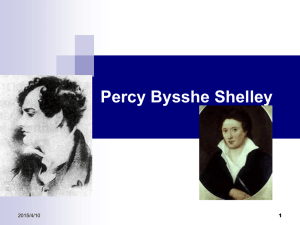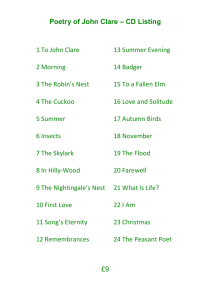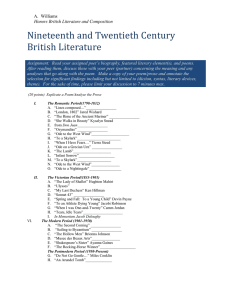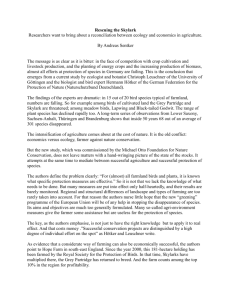Skylark - Caerffili
advertisement
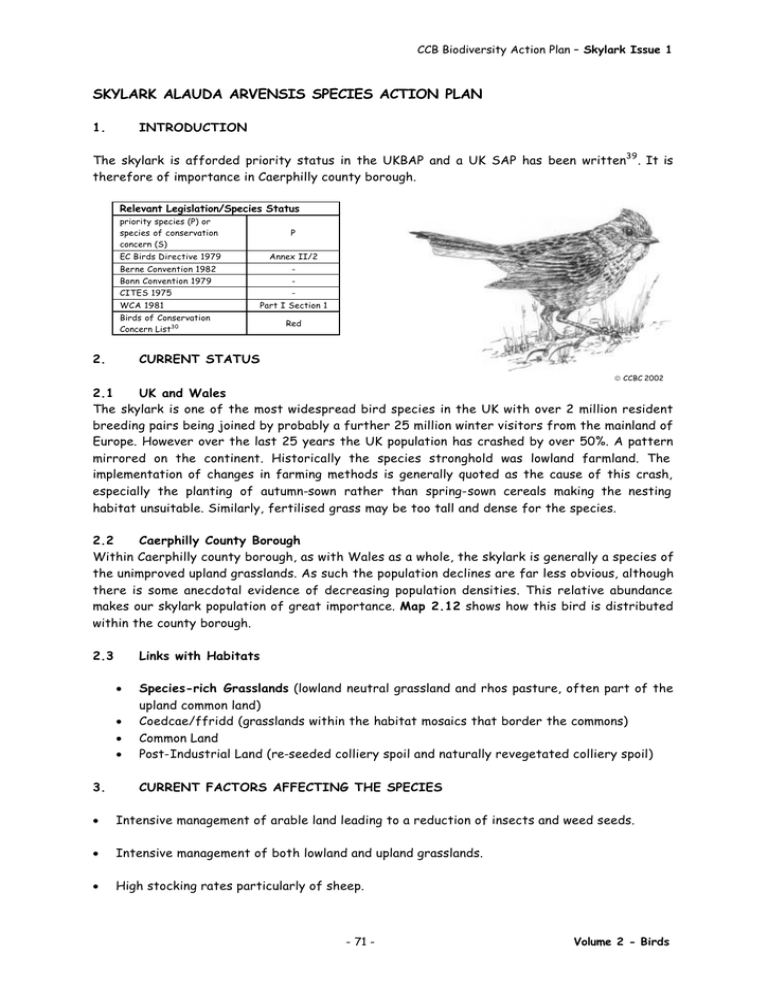
CCB Biodiversity Action Plan – Skylark Issue 1 SKYLARK ALAUDA ARVENSIS SPECIES ACTION PLAN 1. INTRODUCTION The skylark is afforded priority status in the UKBAP and a UK SAP has been written39 . It is therefore of importance in Caerphilly county borough. Relevant Legislation/Species Status priority species (P) or species of conservation concern (S) P EC Birds Directive 1979 Annex II/2 Berne Convention 1982 Bonn Convention 1979 - CITES 1975 WCA 1981 Birds of Conservation Concern List30 2. Part I Section 1 Red CURRENT STATUS CCBC 2002 2.1 UK and Wales The skylark is one of the most widespread bird species in the UK with over 2 million resident breeding pairs being joined by probably a further 25 million winter visitors from the mainland of Europe. However over the last 25 years the UK population has crashed by over 50%. A pattern mirrored on the continent. Historically the species stronghold was lowland farmland. The implementation of changes in farming methods is generally quoted as the cause of this crash, especially the planting of autumn-sown rather than spring-sown cereals making the nesting habitat unsuitable. Similarly, fertilised grass may be too tall and dense for the species. 2.2 Caerphilly County Borough Within Caerphilly county borough, as with Wales as a whole, the skylark is generally a species of the unimproved upland grasslands. As such the population declines are far less obvious, although there is some anecdotal evidence of decreasing population densities. This relative abundance makes our skylark population of great importance. Map 2.12 shows how this bird is distributed within the county borough. 2.3 Links with Habitats • • • • 3. Species-rich Grasslands (lowland neutral grassland and rhos pasture, often part of the upland common land) Coedcae/ffridd (grasslands within the habitat mosaics that border the commons) Common Land Post-Industrial Land (re-seeded colliery spoil and naturally revegetated colliery spoil) CURRENT FACTORS AFFECTING THE SPECIES • Intensive management of arable land leading to a reduction of insects and weed seeds. • Intensive management of both lowland and upland grasslands. • High stocking rates particularly of sheep. - 71 - Volume 2 - Birds CCB Biodiversity Action Plan – Skylark Issue 1 • Reduction in winter stubble fields due to autumn sown crops. • Early silage cutting instead of traditional hay making destroys nests during the breeding season. • Drainage and ‘improvement’ of wet grasslands. • Increased disturbance of nesting sites on commons by the general public particularly when ‘off-roading’ on scramblers or in cars. • Afforestation of the uplands. 4. CURRENT ACTION 4.1 Continued survey work by the BTO. The BTO Breeding Bird Survey contributes to the annual monitoring and recording of skylark populations6 . Some survey work has already been undertaken by CCBC in Caerphilly county borough. 4.2 The Gwent Ornithological Society and Glamorgan Bird Club gather information from members on the distribution of skylarks and both publish annual bird reports17, 18, 19. 4.2 RSPB/Tesco partnership in funding and preparing the UK SAP. 4.3 Ecological studies of the species by the RSPB. 4.4 The Tir Gofal agri-environment scheme may be beneficial to the species, especially in less intensively grazed areas. 5. OBJECTIVES AND TARGETS 5.1 UK Objectives and Targets 5.1.1 Maintain present breeding numbers, wintering numbers and distribution throughout the UK. 5.1.2 Reverse the population decline on lowland farmland and other habitats throughout the UK, where found to be declining. 5.1.3 Protect the skylark's habitat, especially in the breeding season. 5.2 Caerphilly County Borough 5.2.1 Maintain the breeding population in the remaining strongholds of the county borough (Target: ongoing). 5.2.2 Reverse the population decline in the county borough and investigate the possible decline in upland grasslands (Target: 2010). 5.2.3 Protect habitats which are important to the species (Target: ongoing). - 72 - Volume 2 - Birds CCB Biodiversity Action Plan – Skylark Issue 1 6. ACTION AND KEY PARTNERS Action 6.1 Policy and Legislation 6.1.1 Promote farming practices that will benefit the species, for example through the Tir Gofal Scheme. 6.2 Site Safeguard and Management 6.2.1 Adopt sympathetic management of all CCBC land with breeding skylark. 6.3 Species Management and Protection 6.3.1 Continue to implement wildlife legislation. 6.4 Advisory 6.4.1 Educate and inform the local population as to the relative importance of our skylark population. 6.5 Future Research and Monitoring 6.5.1 Survey and monitor skylark populations within the county borough. 6.6 Communications and Publicity 6.6.1 Produce a leaflet regarding the importance of the skylark for biodiversity, to be available at Countryside Parks and other CCBC properties. Ë Key Partners Lead Partners Year to be complete or in place by: 2003 4 5 6 7 8 9 10 11 ü ü ü ü ü ü CCW NAWAD NFU FUW RSPB ü ü ü CCBC - ü ü ü Gwent Police - ü ü ü ü ü ü ü ü ü CBP RSPB Schools Youth Forum ü ü ü ü ü ü ü ü ü GBC GOS BTO CCW Ë CBP - ü Survey year to be determined. - 73 - Volume 2 - Birds CCB Biodiversity Action Plan – Skylark Issue 1 MA P 2.12 - SKYLARK 14 Vi ce C o u n ty B o u n d a ry l l l l l Co n f ir m e d B re e d in g 12 Pr o b a b l e B re e d i ng ¡ Po ss ib le B r ee d in g p Hi sto r i ca l R e c o rd # 10 ¢ Rhymney 08 # l l l l 06 l l l l SO l 04 l lNew l l Tredegar 02 l l l l l l 00 l l Bargoed l l ¢ 98 # ¢ Blackwood # # l l Newbridge 96 l ¢ l l l ¢ Ystrad l Mynach 94 # l ¢ l l l Risca 92 # l l l l l l Machen 90 ST # l l l l l 88 Caerphillyl l l ¢ # l 86 l l ¢ l l l 84 l 82 06 08 10 12 14 16 18 20 22 24 26 28 R ep ro d uce d fro m th e Ord na n ce S u rv ey m app in g w ith t he p erm issio n of t he C on tro lle r o f He r M aje sty's S ta tion e ry Of fice C row n c opy rig h t. U n au th o rise d re pro d uct ion in fring es C row n co py righ t a nd m a y lea d to p ro se cu tion or civil p roce ed ing s. C a erph illy C o unt y B oro u gh C ou n cil, LA 0 90 0 4L, 20 0 1. At gyn hyrch w yd o f ap iad y r Aro lw g O rd n an s gy da ch a niat a d rhe o lw r Llyf rf a ei M a w rh yd i h aw lf rain t y G oro n . M ae a tg yn hyrch u h e b aw du rdo d yn to rri h a wlf raint y Go ro n . G all h yn arw ain at e rlynia d n e u a ch o s sif il. Cy ngo r B wr de ist ref Siro l C a erf fili, LA 0 90 0 4L, 2 0 01. Map data sources: GOS 1998-2000 and 20 - 74 - Volume 2 - Birds
